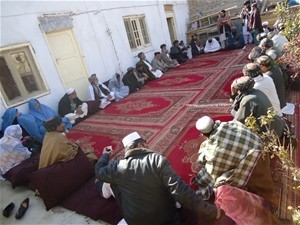
The RLS-I Regional Conflict Resolution Commission (RCRC) resolving an historic intractable dispute in Arghandab, Kandahar.
RLS-I Checchi Consulting
1 MARCH 2011 | KANDAHAR PROVINCE, AFGHANISTAN
Arghandab in Kandahar is a district renowned for its fierce local pride and proud farming tradition. However in recent years it has become better know as a district of conflict, which has brought with it political instability and poverty.
With support from USAID, elders and local government officials joined to address some long-standing family and community disputes that were negatively affecting the district. They decided to try a new approach to dispute resolution and sought support from neutral agents in the form of elders from neighboring districts and provinces, experienced and respected in alternative dispute resolution.
Simultaneously, the concept of creating a Regional Conflict Resolution Commission to address major destabilizing community disputes was conceived in December 2010, in Kandahar at a USAID-sponsored conference of 90 elders from Hilmand, Uruzgan, Zabul, and Kandahar city. In January, the concept became a reality when 25 representatives from that conference, including six female elders, reconvened in Kandahar city over four days to design a conflict resolution process to try in Arghandab District.
What is significant about this initiative is not just the impetus to tackle protracted disputes that have plagued local villagers for years, but the involvement of skilled elders from neighboring provinces to act as "neutral agents" in dispute resolution.
As a result of this four-day meeting in Kandahar city, a Regional Conflict Resolution Commission was born and a pilot process was designed and tried on two intractable disputes in Arghandab District. The first was a 12-year-old land dispute between Pashtun and Baloch tribes. The second was a ten year-old conflict arising from a violent incident related to a land dispute between two Pashtun families. These historic disputes were resolved in just a few days.
“I am very grateful for the support provided to resolve long standing disputes in Arghandab,” said the Arghandab District Governor. “I am sure this conflict resolution initiative will improve relations between the government, tribal elders, and residents. This is good for our future and our stability.”







Comment
Make a general inquiry or suggest an improvement.